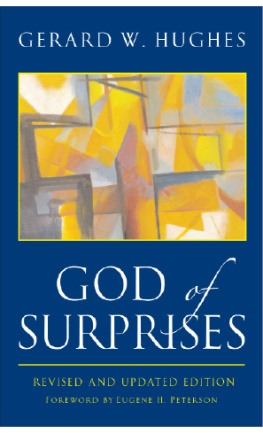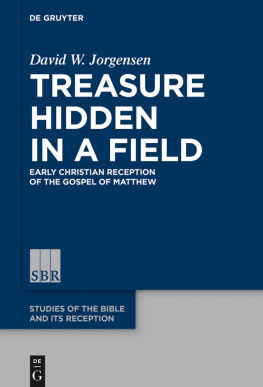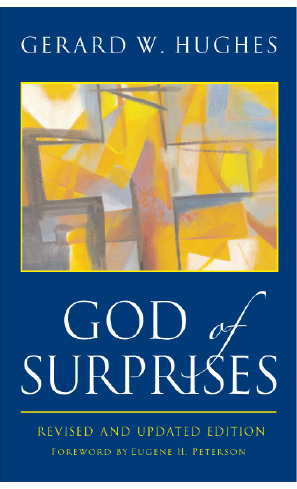First published in 1985 by
Darton, Longman and Todd Ltd
1 Spencer Court
140142 Wandsworth High Street
London SW18 4JJ
This revised and updated edition 2008
1985, 1996, 2008 Gerard W. Hughes SJ
The right of Gerard W. Hughes to be identified as the Author of this work has been asserted in accordance with the Copyright, Designs and Patents Act 1988.
A catalogue record for this book is available from the British Library
Digital Edition converted and published by Andrews UK Ltd 2010
Dedication
In gratitude to all with whom
I have walked the inner journey
Acknowledgement
The scriptural quotations are taken from The Jerusalem Bible, published and copyright 1966, 1967 and 1968 by Darton, Longman and Todd Ltd and Doubleday & Co. Inc., by permission of the publishers.
Preface (to second edition)
Since God of Surprises was first published in November 1985, I have frequently been asked how I came upon the title. I first found the phrase God of Surprises in reading Fr Karl Rahner years before, but I did not set out to write a book with that title. It was the circumstances in which I was living at the time I was writing which reminded me of Rahners phrase.
In December 1983 I left St Beunos in North Wales, where I had lived since 1976. I was asked to go and work permanently in South Africa as National Chaplain to Catholic students in South African Universities, and also to become Secretary for Ecumenism to the South African bishops, starting work in June 1984. Meantime, I was free to do whatever work I wanted. I wanted time to climb hills, think, reflect, and, perhaps, to write.
I had heard that there was a Catholic church on the Isle of Skye, which had no resident priest. Attached to the church, was a room which afforded overnight accommodation for a visiting priest. I had a picture of this church in my imagination. It was perched on a hill overlooking the sea and the Cuillin mountains. The room was spacious with large, broad-silled windows on three sides on which all kinds of interesting sea-birds would perch. When I offered my services to this church for four months, the parish priest of Glenfinnan, who had to make a 150 mile journey to Skye once a month, gladly accepted my offer.
I arrived on Skye on a bitterly cold Saturday evening in March, having been held up in snowdrifts on the way from Fort William. The church was in the middle of a council housing estate. The room was narrow, with two small windows high on the wall which were opened by pushing outwards. They looked out on a steep, mossy bank twenty feet away, so the room was always dark. There was a small, delicate and unsteady table which served for writing and dining.
On the Sunday afternoon, I heard a tinkle of glass in the chapel and discovered a brick in the aisle. Another brick came through a few days later, and then a thrower of commendable accuracy managed to get a stone through the narrow window of my room. Ecumenism had made little progress in staunchly Presbyterian Skye, but after a visit to the headmaster of the local school the stone-throwing ceased.
On my first Monday morning a bulldozer, cement-mixer, and three builders with their radios permanently tuned to Radio 2, arrived and started on a new building thirty feet from my window. The building was not to be completed until a few days before my departure at the end of June.
In December 1983, I had applied for a work visa for South Africa. Each day I went to the Post Office in Portree, Skyes main town, to collect my mail, hoping for a letter from the South African Embassy. It was not until the end of May that I received a curt reply that my request had been refused.
As God is in all things, I could claim that the title, God of Surprises, was God-given!
I began by trying to sketch out a rough shape for the proposed book. Shape eluded me. I tried a few opening sentences for the preface and produced nothing coherent. The bulldozer and the radios did nothing to help, except to suggest two possible titles: Finding God in the Chaos, or The Answer is in the Pain. Frustration eventually enabled me to abandon the attempt to plan the book carefully, and I then decided to force myself to sit at the typewriter and produce three to four thousand words each day. Grammar, syntax, style, repetition did not matter. I found this a most helpful method. I was writing about topics which interested me, and it was through the writing that the book slowly began to take shape. By the end of June, the manuscript was still without clear form and I had the occasional inner tantrum, deciding to abandon the writing. I sent a very rough version to Teresa de Bertodano at Darton, Longman and Todd to ask whether she thought anything could come of it. Instead of the brief reply I feared, she sent me pages of detailed comment and encouraged me to continue. Without that encouragement I would probably have abandoned the task.
It was only after I left Skye and was doing other work that I began to see connections between sections of the book. This was the most enjoyable part of the writing, as though a shape was emerging which had nothing to do with my conscious planning, and in March 1985, I sent the completed manuscript to DLT. I was glad to have finished it, but also unsure of how it would be received.
For me, a great surprise and joy has been the reception the book has received, its large sales, and its translation into thirteen other languages, including a proposal for a Chinese version. But most encouraging have been the letters from people of all ages, of many nations, and from very different bands of the religious, political, social, and cultural spectrum. It is encouraging because it confirms the truth that our unity in God is not something we have to create, but something we have to discover. Many people have written telling me that doing the exercises offered at the end of each chapter has helped them to find a greater unity within themselves and a greater ease and tolerance in their relationships with others.
In the intervening ten years since publication, all my experience has confirmed this truth that God is in all things, in every event, in every individual, whatever their religion or lack of it. Although I wrote of the God of surprises, like most other people, I never dreamed that within a few years of writing the Soviet Union would have collapsed, that Nelson Mandela would have become President of South Africa, that there would be peace in Lebanon, peace agreements between Israel and the Palestinians, a bloodless coup in the Philippines, an Anglo-Irish agreement and ceasefire in Northern Ireland or that Cruise missiles would have disappeared from Greenham Common and Molesworth, lessening the immediate danger of nuclear conflict. However, in this second edition, I have left the final chapter, God and the Nuclear Threat, unchanged, for, as I then wrote, Supposing, and it is a very unlikely supposition, that our nuclear arms were to succeed in ridding us of the Soviet threat, how long would it take us before we found another enemy? Until we face the real enemy, the nuclear holocaust is bound to come sooner or later. The real enemy is in ourselves, in our flight from the God of compassion into the security of a god of wealth, power and status, both individual and national.
Karl Jung once wrote, I cannot define for you what God is. I can only say that my work has proved empirically that the pattern of God exists in everyone, and that this pattern has at its disposal the greatest of all energies for the transformation and transfiguration of our natural being. The treasure is hidden within each of us. The Kingdom of God is like the yeast in the dough of our being. We can leave the yeast on a shelf of our consciousness, firmly sealed, or we can knead it into the messy, everyday events of our lives to work its transforming power. All lasting change begins in the individual, or it does not happen at all.









